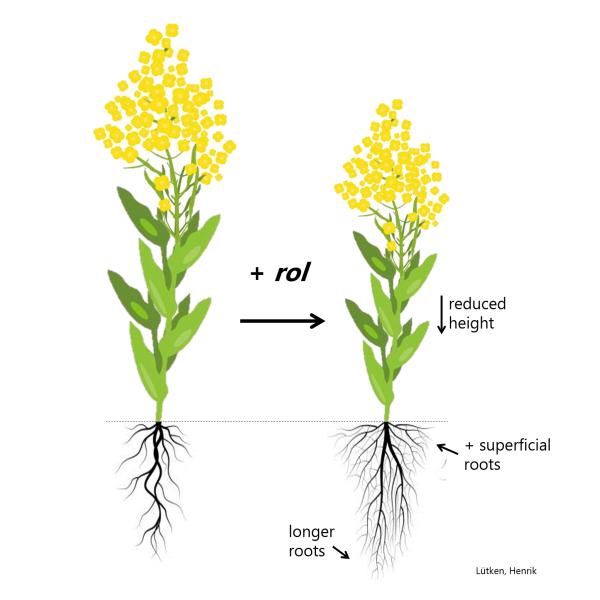Development of novel breeding technology for improved root system, drought tolerance and sustainable plant productions

Source: Desmet et al. (2019) Appl Microbiol Biotechnol (https://doi.org/10.1007/s00253-020-10403-7)
(1) Climate change in Europe will result in higher risks for drought spells and changes in precipitation with an earlier water deficit in summers and heavier precipitations during autumn and winter. Consequently, prolonged shortages in water supply will cause considerable yield losses.(2) Furthermore, chemical plant growth regulators are harmful for humans and the environment and it is expected that applications will be increasingly restricted and banned in the near future. Both issues are main problems for our European farmers and growers. In this project we intend to develop a sustainable solution for both problems by a novel breeding technology focusing on the roots. By enhancing root growth a better adaptation of plants to stress can be obtained by providing plants with improved capacity to exploit soil water resources and a higher tolerance to plant replant disease. Transfer of bacterial genes to crops in a natural way will also result in compact plants which can be produced with less agro-chemicals.

Source: Henrik Lütken
In this project we focus on the development of a new approach using rhizogenic agrobacteria as a novel breeding technology. Natural rhizogenic strains of Rhizobium rhizogenes carry a unique plasmid (the root inducing (Ri) plasmid, containing a.o. the rol genes), which allow the DNA (T-DNA) located on the Ri plasmid to be transferred and integrated in the plant host nuclear genome. This will result in root formation (i.e., hairy roots). From these hairy roots, by tissue culture techniques whole plants can be regenerated, the so-called Ri plants. The presence of Ri T-DNA genes in such plants leads to marked changes in plant morphology. Traits often associated with the Ri phenotype include increased rooting ability and compact growth next to some changes to flower and/or leaf morphology. These Ri plants are pre-breeding material, i.e. the first step in a new breeding strategy where crosses of Ri plants, selection and molecular monitoring of the segregation of the rol genes go hand in hand to obtain a commercial variety or cultivar with a stronger root system and all qualitative standards.
The specific objectives of the project are:
1) to develop a biotechnological breeding tool by rhizogenic agrobacteria;
2) to optimize plant regeneration from transformed roots;
3) to in depth characterize phenotypic changes of the obtained regenerants above- and belowground;
4) to test obtained regenerants for requiring less chemical plant growth regulators;
5) to test the stress performance of obtained regenerants against drought and replant disease;
6) to monitor heredity of the introduced genes transferred by rhizogenic agrobacteria;
7) to implement the use of rhizogenic agrobacteria as breeding tool in a breeding strategy.
These objectives will be implemented in this project on selected model crops widely grown over Europe (sunflower, rose, apple, chrysanthemum). They were specifically selected because (1) they suffer from drought (sunflower, apple, chrysanthemum), (2) are often treated with plant growth regulators to obtain a qualitative plant architecture (chrysanthemum) or (3) suffer from replant disease (apple, rose).
Plants that originate from this technique are not considered genetically modified organisms (GMO) because a non-modified natural strain is used for transformation. Therefore a wide range of applications becomes possible in breeding and sustainable plant production. At the same time, this project ensures in depth research of this breeding tool based on rhizogenic bacteria by a multidisciplinary approach. The outcome will be a new breeding technology for the agricultural and horticultural sector enabling a more sustainable and resilient production.

Source: Ellen De Keyser
Dr. Ellen De Keyser
Flanders Research Institute for Agriculture, Fisheries and Food (EV-ILVO), Plant Unit, BELGIUM
Email: Ellen.dekeyser@ilvo.vlaanderen.be

Source: Emmy Dhooghe
Dr. Emmy Dhooghe
Flanders Research Institute for Agriculture, Fisheries and Food (EV-ILVO), Plant Unit, BELGIUM
Email: Emmy.dhooghe@ilvo.vlaanderen.be
For the Flemish part, EV-ILVO is working together
with 2 private companies
Prof. Traud Winkelmann
Leibniz Universität Hannover, GERMANY
Prof. Thomas Debener
Leibniz Universität Hannover, GERMANY
Prof Jarosław Tyburski
Nicolaus Copernicus University, POLAND
Dr. Adriana Aurori
University of Agricultural Science and Veterinary Medicine Cluj-Napoca, ROMANIA